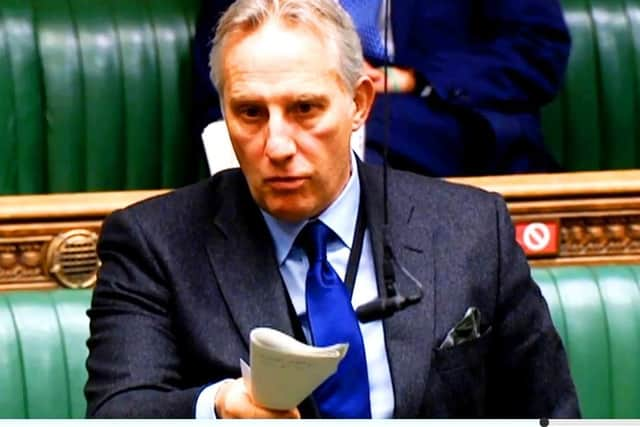Alex Kane: Getting angry has never done unionism any favours


In the past few days the DUP has been pointing the finger of blame at the SDLP, SF, Alliance and a host of business organisations; insisting it’s their collective fault there is a border in the Irish Sea and empty shelves across Northern Ireland.
According to the DUP – and, in fairness, other unionist parties too – it was the lobbying of these other parties and organisations which delivered the sea border and the present inconveniences.
Advertisement
Hide AdAdvertisement
Hide AdBut if the DUP is correct, it raises a question. An important question. Why were unionist concerns ignored? Why did Boris Johnson conclude it was more important to placate those who didn’t care (indeed, some welcomed it) if Northern Ireland was treated in a manner which shook its constitutional status and pushed it further from Great Britain’s ambit?


And a side question, too: why did Johnson pursue a course which is clearly damaging (as he knew it would) the financial interests of many businesses in Northern Ireland, as well as creating enormous problems for trade to and from Northern Ireland?
I accept every new arrangement is accompanied by teething problems, yet I also sense Johnson, Gove and Rees-Mogg (who made a monumental fool of himself the other day when he described British fish as “happier fish” now) couldn’t really care if all the teeth are pulled as painfully as possible.
Ian Paisley looked as though he had just come from the dentist’s chair when he spoke in the House of Commons a few days ago. He was angry. Angrier than I have seen him for some time. Waving his rolled-up order papers like someone who has just seen his friends on another train, on another track, heading in the opposite direction. Seeing him, but ignoring him.
Advertisement
Hide AdAdvertisement
Hide AdHe was angry. Sammy was angry. Jeffrey was angry. Back here Jim Allister and Steve Aiken were angry. Echo chambers on social media were full of angry unionists and loyalists. Kate Hoey was angry in a piece she wrote for the Daily Telegraph.
Other columnists on other platforms were angry. I was angry (although most of my anger was directed at those who thought it was ever sensible to trust Johnson, Gove, the ERG, the Conservative party in general, or the circle of tone-deaf Thénardiers around Farage).
But do you know something, this sort of anger doesn’t actually amount to a hill of beans. I’m not sure unionist/loyalist anger has made a button of difference since the concerted political/electoral/on-the-ground activity which brought down Sunningdale in May 1974.
Even the huge crowd which turned out in Belfast on November 23, 1985 (to protest against the Anglo-Irish Agreement) didn’t, in the end, change a thing. The anger surrounding Drumcree didn’t change anything. The anger – and protest meetings – which greeted Johnson’s border proposals in November 2019 didn’t change anything either.
Advertisement
Hide AdAdvertisement
Hide AdAnger requires more than loud words (however well expressed), or passion (I still remember Harold McCusker’s brilliant and moving response to the AIA). It requires more than doomed-to-failure protests, empty threats and accusations of betrayal. It requires more than further divisions within unionism, or the emergence of new, harder voices.
It requires more than “we’re-mad-as-hell-and-we’re-not-taking-it-anymore” rhetoric. It requires more than fatuous promises to ‘make the government listen to us’.
Anger, by itself, doesn’t work. The reason for the anger needs to be understood and backed up by political/media support, particularly in London and Dublin (unionists should never underestimate the reluctance of so many in the RoI to unite Ireland anytime soon). It needs to be accompanied by a long-term strategy to address the cause of the anger.
It requires unity among the people who feel the anger (and no, I don’t just mean one unionist vehicle). And there needs to be solid, demonstrable evidence the anger is being replaced with optimism based on a thought-through response to the cause of the anger.
Advertisement
Hide AdAdvertisement
Hide AdAn old friend – who would have described himself as a hardline unionist – opted out of political activity about a year after the Anglo-Irish Agreement. His reason was simple: he couldn’t see the point of door-knocking and party membership if unionism always seemed to be on the back foot and incapable of producing effective strategies.
I spoke to him last week and he reminded me of his prediction – in late 1998 – the DUP wouldn’t bring down an Assembly it claimed to oppose, but would find a way of pretending to make it work, “even when most of the evidence indicated the exact opposite”.
He made another crucially important point while we talked: “I just don’t bother getting angry anymore. There’s no point. People will be wound up, stupid promises will be made, unionists will start fighting each other again and the UK government, if we can still talk of such a thing, will go on ignoring us. Come on, Alex, tell me I’m wrong.”
He might now belong (he’ll phone me and let me know) to what Marcus Leroux, in his recent piece on polling and border polls, described – wonderfully – as a ‘previously unidentified political species: the scundered unionist’. Marcus has, I think, hit on something quite significant.
Advertisement
Hide AdAdvertisement
Hide AdMaybe too many unionists no longer have a passionate and openly emotional input into events because they don’t believe their anger or concerns will be addressed by their own representatives, let alone by a UK government.
——— ———
A message from the Editor:
Thank you for reading this story on our website. While I have your attention, I also have an important request to make of you.
With the coronavirus lockdown having a major impact on many of our advertisers — and consequently the revenue we receive — we are more reliant than ever on you taking out a digital subscription.
Subscribe to newsletter.co.uk and enjoy unlimited access to the best Northern Ireland and UK news and information online and on our app. With a digital subscription, you can read more than 5 articles, see fewer ads, enjoy faster load times, and get access to exclusive newsletters and content. Visit https://www.newsletter.co.uk/subscriptions now to sign up.
Advertisement
Hide AdAdvertisement
Hide AdOur journalism costs money and we rely on advertising, print and digital revenues to help to support them. By supporting us, we are able to support you in providing trusted, fact-checked content for this website.
Alistair Bushe
Editor